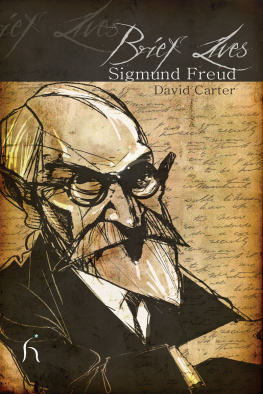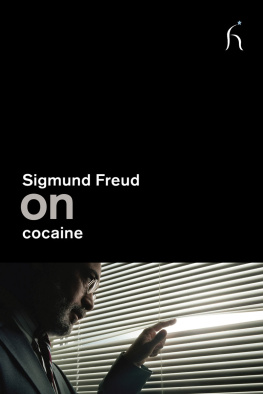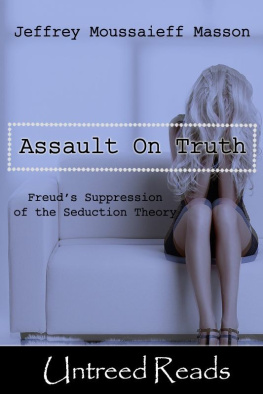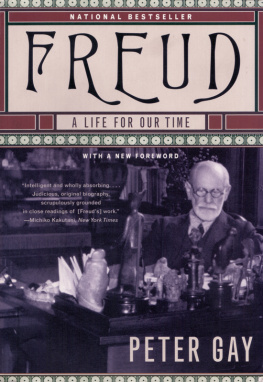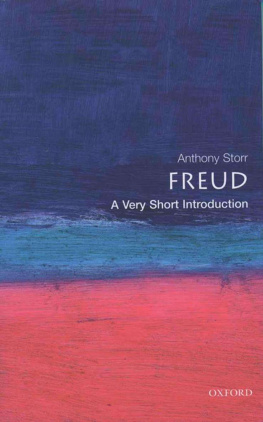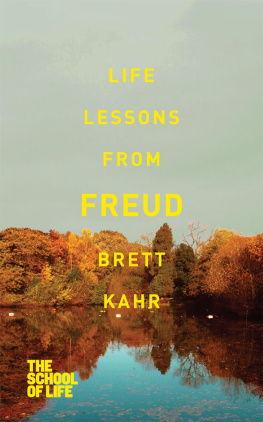
Brief Lives
Published by Hesperus Press Limited
19 Bulstrode Street, London wiu 2 JN
www.hesperuspress.com
First published by Hesperus Press Limited, 2011
Copyright David Carter, 2011
The right of David Carter to be identified as the Author of the Work has been asserted by him in accordance with the Copyright, Designs and Patents Act 1988.
Designed and typeset by Fraser Muggeridge studio
Printed in Jordan by Jordan National Press
I SBN: 978-1-84391-922-3
All rights reserved. This book is sold subject to the condition that it shall not be resold, lent, hired out or otherwise circulated without the express prior consent of the publisher.
Contents
Introduction
The family history of the man who stressed the importance of family history for an understanding of psychological development must be of particular interest to those seeking insight into his life. However, Sigmund Freud was always guarded and discreet about all matters relating to his family. In many cases it is only possible to state what seems most likely to be true; in some cases one must describe the various possible accounts; and occasionally it is wise to claim only that something is plausible but unverified. Fortunately, however, there are a considerable number of facts on which all biographers agree. Certain, for example, is that he was born at half past six on 6 May 1856, at 117 Schlossergasse in the small Moravian town of Freiberg, now known as P ibor. There have been some attempts to question this date in favour of an earlier one, due to an illegible entry in a birth register, but the evidence for its correctness is not now generally disputed. Biographers have taken pains to stress the uncertainties that accompanied him from birth: had his father had two or three wives, and how could he already be the uncle of a boy older than himself?
There is also little documentary evidence for the origins of the Freud family. Freuds own account in his short autobiographical essay of 1925 is based on family hearsay It seems that his father met the secretary of the Jewish community in Cologne one day by chance, and the man told him that the Freuds could trace their descent back to that city in the fourteenth century Freud claimed that his ancestors were among those Jews who fled persecution by moving eastward in the fourteenth and fifteenth centuries. In the course of the nineteenth century they moved further, from Lithuania into Galicia. Here the family divided, one part to Romania and the other to Moravia.
The main sources for Freuds life consist of his own voluminous correspondence, his Autobiographical Study of 1925, personal reflections and allusions in his psychoanalytic writings, and the major biographies. Among these, that by Ernest Jones, due to his personal contacts with Freud and his family, and despite its weaknesses and biases, remains indispensable. Peter Gays Freud, A Life for Our Time, demands respect for its thorough evaluation of evidence. It contains also an impressive Bibliographical Essay, but an idiosyncratic system of annotations. It blends well accounts of the life, the works and the cultural and historical background.
The present biographer has the advantages and limits of a Brief Life. It must of necessity focus on the events involving Freud and his family, with consideration of other persons only as they impinge on that life. The advantage of a short biography, following a strict chronological sequence, is that it can bring into relief the overall development of the life. In the major bio graphies, as excellent as they are, it is often difficult to see the wood for the trees.
A problem for all biographers is how to divide up the constant flow of a life into chapters. I have opted to highlight major features of the periods in the chapter headings.
I would also like to express my very belated appreciation of the help provided by Anna Freud and the family maid Paula Fichtl, while researching for my Ph.D. on Freud in what was then still the Freud family home in Maresfield Gardens, London.
Childhood and Adolescence
(185673)
Freuds biographer Ernest Jones has stated unequivocally that Freuds father, Jakob, had two wives, but Peter Gay has stated just as unequivocally that he had three. Whatever the truth of the matter, Sigmund was the son of the last of them, born Amalie Nathansohn (the most commonly accepted spellings for both names). Jakob was a wool merchant, though not very well off. His mother came from the north-eastern part of Galicia near the Russian frontier. They were married in 1855, when Jakob was already forty. She was only twenty-one when she had her first child, whose name was registered in the family Bible as Sigismund Schlomo, the latter after his paternal grandfather. By the time he entered the University of Vienna in 1873, Freud had developed a firm preference for the form Sigmund. When Jakob married Amalie in 1855, he had two sons from his first marriage: Emanuel, already married with children; and the younger one, Philipp, unmarried. Emanuels son, John, was a year older than his uncle Sigismund Schlomo, who for the sake of simplicity will be henceforth referred to only as Sigmund. Sigmund and John became firm friends and Freud later admitted that this relationship had conditioned the way he was to conduct many of his friendships in later life.
Amalie was to bear seven more children: Julius, who only survived for eight months; Anna, in December 1858, when Sigmund was in his third year; Rosa; Marie (known as Mitzi); Adolfine (known as Dolfi); Paula; and Alexander. In later correspondence Freud was to admit that the death of young Julius had undoubtedly affected him deeply. He believed that the advent of the young child, depriving him of his mothers full attention, had awoken death wishes against his young brother, and when the child eventually died he developed a sense of guilt for having had such thoughts that was to stay with him for a long time.
Most influential on his psychological development seems to have been not his relationship with his siblings but that with his nephew John. His feelings for John were alternately affectionate and hostile. Freud commented in later years that this combination of contrasting feelings was to have a determining effect on how he developed all of his later friendships with people of the same age. He felt that an intimate friend and a hated enemy had always been indispensable to his emotional life, and sometimes they had coincided in the same person, albeit not at the same time as in his childhood relationship with John. Freud was later to recall an adventure he shared with John when he was about three years old, and involving Johns sister Pauline. In this memory Sigmund and John had been collecting flowers in a meadow in the company of Pauline. They suddenly turned on the girl, attacking her physically, and possibly sexually, taking away her bunch of flowers.
Another person who featured prominently in Freuds early life and later in his self-analysis was his nanny, a devout Roman Catholic, who was apparently old and ugly and often dragged young Sigmund off to church with her. He seems to have loved her though, and may even have learned about sexual matters from her (another one of those plausible but unverified facts). Round about the time when his mother was giving birth to his sister Anna, the nanny suddenly disappeared. Freud later discovered that she had been caught stealing and that his half-brother Philipp had insisted on her being arrested. The upshot was that she was sent to prison for ten months. Freud retained an odd memory of this incident, in which he clearly associated his mothers absence with the disappearance of the nanny The significance of the memory he only unravelled in the course of his self-analysis about forty years later In the memory he saw himself standing in front of a chest, which Philipp was holding half-open The young Sigmund, in tears, was asking him something Finally, his mother, looking slim and not pregnant, came into the room. Freud recalled also that when the nanny had disappeared, he had suspected Philipp of somehow being the cause of this and had asked his half-brother what had happened to her. Philipp had replied Sie ist eingekastelt. This means literally She has been put in a chest, but it was a current idiom meaning She has been put in prison. Freud could thus construe his memory as a childs literal interpretation of Philipps words. As Philipp and his mother were of a similar age, Freud believed that the memory indicated a childish fear that Philipp might also be responsible for his mothers absence; in other words, that Philipp was the father of the new baby. Remembering the opening of an empty chest and the appearance of a slim mother were thus ways of reassuring himself that this was not the case.
Next page
